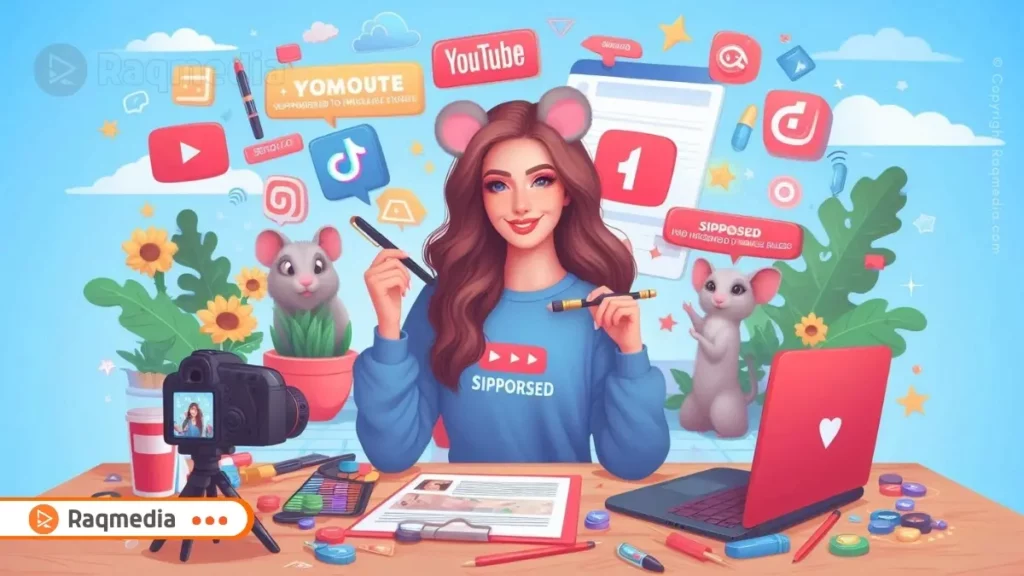In the fast-evolving realm of digital marketing, a notable shift is underway as brands increasingly set their sights on the dynamic landscape of micro-influencers over their larger-than-life counterparts. Explore the rise of micro-influencer partnerships in brand collaborations. See why big names are making the switch!
This strategic pivot marks a significant departure from traditional mega influencer sponsorships, heralding a new era where authenticity and cost-effectiveness reign supreme. The allure of micro-influencer collaborations lies not only in their ability to forge genuine connections but also in the tangible value they bring to brands seeking meaningful engagement within niche markets.
Why Big Brands Are Ditching Celebs for Micro-Influencer Partnerships
Amidst this burgeoning trend, the partnership landscape is witnessing a metamorphosis characterized by an emphasis on meaningful relationships and tailored content creation. Micro-influencers wield a unique power in curating genuine connections with their followers, paving the way for more authentic brand partnerships. As brand managers, marketers, and social media professionals navigate this transformative terrain, the appeal of these smaller-scale influencers becomes increasingly apparent – not just for their niche appeal but also for the savvy cost-effective strategies they offer.

By delving into how these collaborations foster genuine engagement while optimizing return on investment, an intriguing narrative unfolds—one that beckons readers to delve deeper into the nuances of this paradigm shift shaping contemporary brand-consumer relationships.
The Benefits of Micro-Influencers
In the dynamic landscape of influencer marketing, the allure of micro-influencers continues to grow, and for good reason. These digital tastemakers offer a distinct set of advantages that resonate deeply with brands seeking meaningful connections with their target audiences. One key benefit is the higher engagement levels micro-influencers tend to command. Take, for example, a fitness enthusiast with 20,000 followers on Instagram: while this follower count may pale in comparison to mega influencers, the audience is highly engaged and actively interested in health and wellness content. As a result, when this micro-influencer recommends a particular brand of workout gear or nutritional supplement, their followers are more likely to pay attention and act upon those recommendations.
Moreover, authenticity lies at the core of micro-influencer partnerships. Unlike their larger counterparts who may juggle multiple collaborations simultaneously, micro-influencers often have closer relationships with their followers. For instance, imagine a beauty blogger who regularly engages with her audience through personal stories and genuine product recommendations. When she aligns with a skincare brand she truly believes in, her authenticity shines through, fostering trust among her followers and establishing credibility for the brand.
From a strategic standpoint, collaborating with micro-influencers can also unlock cost-effective campaigns that yield impressive returns on investment for brands. By working with influencers who maintain smaller but devoted followings within specific niches like sustainable fashion or vegan cuisine, brands can maximize their marketing budgets while reaching highly targeted audiences primed for conversion. This shift towards micro-influencer partnerships signifies not just a change in scale but an evolution towards more authentic and effective influencer marketing strategies tailored to engage modern consumers in meaningful ways.
Targeting Niche Audiences With Micro-Influencers
Micro-influencers play a pivotal role in targeting niche audiences due to their ability to cater to specific demographics with unparalleled precision. For instance, imagine a beauty brand looking to connect with eco-conscious consumers interested in sustainable skincare. By collaborating with a micro-influencer who advocates for green living and cruelty-free products, the brand can tap into a highly engaged audience that aligns closely with its values. This targeted approach allows brands to reach the right people who are more likely to resonate with their message and offerings.
Micro-influencers often have a more genuine and engaged relationship with their followers. Their recommendations are perceived as more trustworthy compared to celebrity endorsements, which can sometimes feel commercialized and impersonal. Brands benefit from this authenticity, as consumers are more likely to trust and act on a micro-influencer’s suggestion.
The personal touch that micro-influencers bring to their content is a game-changer for brands seeking authenticity and relevance in their marketing efforts. Unlike mega influencers who may have millions of followers, micro-influencers benefit from smaller, more intimate communities where they can interact on a more personal level. Consider a fitness apparel brand partnering with a micro-influencer who shares her fitness journey and workout routines while showcasing the brand's products organically. The personalized content created by micro-influencers fosters a sense of connection and loyalty among their followers, translating into higher engagement rates for brands.
Moreover, the trust factor plays a significant role in the success of campaigns led by micro-influencers targeting niche audiences. When a fashion boutique collaborates with a micro-influencer known for her impeccable style and impeccable taste in affordable yet chic clothing pieces, her followers are more inclined to trust her recommendations. This inherent trust stems from the authentic connection micro-influencers have established with their audience over time. By leveraging this trust, brands can enjoy higher conversion rates as niche followers are more likely to act on recommendations from influencers who share their passions and interests authentically.
In essence, the ability of micro-influencers to target specific niches through personalized content while fostering genuine trust creates an ideal environment for brands looking to connect deeply with relevant audiences. This strategic approach not only enhances campaign effectiveness but also cultivates long-term relationships built on mutual understanding and credibility between brands, influencers, and consumers alike.
Authenticity of Influencers
Authenticity is a cornerstone of successful influencer marketing strategies, and micro-influencers are masters at fostering genuine connections through storytelling. These influencers have a knack for weaving relatable narratives that resonate deeply with their followers. For instance, imagine a fitness micro-influencer sharing their personal journey to wellness, complete with the struggles and triumphs they encountered along the way. Such authenticity allows their audience to not only engage with the content but also feel a genuine connection to the influencer as they share common experiences.
Partnering with micro-influencers is significantly more cost-effective than hiring celebrities. Micro-influencers typically charge lower fees while still offering high engagement rates. This allows brands to allocate their marketing budget more efficiently, often enabling collaborations with multiple influencers and reaching diverse audiences without breaking the bank.
One of the key strengths of micro-influencers lies in their ability to provide authentic recommendations. Their voice carries an air of credibility and trustworthiness that larger influencers sometimes struggle to maintain. Consider a beauty micro-influencer passionately endorsing a skincare product they genuinely love, based on their own positive experience with it. This kind of genuine endorsement cuts through the noise of traditional advertising and resonates with followers on a more personal level, leading to higher levels of engagement and brand loyalty.
By seamlessly integrating brand messages into their engaging stories, micro-influencers cultivate lasting relationships with their audience built on trust and loyalty. Picture a travel micro-influencer who not only showcases stunning destinations but also shares insightful tips and personal anecdotes about each place visited. Through these authentic narratives, followers develop a deeper connection with both the influencer and the brands they promote.
This bond goes beyond mere transactions, fostering enduring brand loyalty driven by genuine storytelling and relatable experiences. In essence, micro-influencers excel at leveraging storytelling as a powerful tool to forge meaningful connections with their audience while authentically representing brands in an impactful way.
Cost Efficiency and ROI Optimization
In the realm of influencer marketing, one key advantage of partnering with micro-influencers is the cost efficiency it offers. For smaller brands or businesses with limited marketing budgets, collaborating with micro-influencers presents a more accessible avenue compared to mega influencers who demand substantial fees. By allocating resources towards micro-influencers, brands can achieve significant reach and engagement without breaking the bank. For instance, a local skincare brand may find it more financially sustainable to work with several micro-influencers within the beauty niche to promote its products effectively while staying within budget constraints.
Moreover, the focus on measurable results sets micro-influencer sponsorships apart as a strategic investment for brands seeking tangible outcomes from their campaigns. With the ability to track performance metrics accurately, such as likes, shares, click-through rates, and conversions, brands can gain invaluable insights into how their partnerships with micro-influencers are resonating with their target audience.
This data-driven approach enables marketers to refine their strategies in real-time based on what is working best for their brand goals. For example, an athleisure brand partnering with fitness-focused micro-influencers can closely monitor engagement levels and sales generated through unique tracking links provided by each influencer.
Micro-influencers usually cater to specific niches and have highly engaged audiences. By partnering with micro-influencers, brands can target niche markets more effectively and benefit from higher engagement rates. This targeted approach often results in more meaningful interactions and better conversion rates, as the content resonates more deeply with the audience.
By leveraging the combination of lower costs and targeted engagement that comes with micro-influencer partnerships, brands unlock a higher potential for return on investment (ROI). The personalized nature of collaborations with micro-influencers allows for more strategic alignment between brand messaging and audience interests. This tailored approach often leads to increased conversion rates and customer loyalty due to the genuine connections established through these partnerships.
As an illustration, a sustainable fashion brand collaborating with micro-influencers passionate about eco-friendly lifestyles can yield not only immediate sales but also foster long-term customer relationships built on shared values—an invaluable outcome for any brand looking to maximize its ROI in the long run.
Embracing the Power of Micro-Influencers
In conclusion, the trend of brands shifting towards micro-influencer sponsorships is a strategic move rooted in authenticity, cost-effectiveness, and targeted engagement. By leveraging the benefits of working with micro-influencers, brands can unlock higher levels of audience engagement, build trust through authentic storytelling, and optimize their return on investment. The era of mega influencers dominating the social media landscape is giving way to more personalized and relatable content brought to life by micro-influencers who hold significant influence within their niche communities.

Brands are recognizing that partnering with micro-influencers allows them to tap into specific demographics and create tailored campaigns that resonate deeply with their target audiences. These collaborations foster genuine connections between influencers and followers, leading to increased brand loyalty and conversion rates. As a result, brands are not only achieving cost efficiency but also driving measurable results due to the focused approach enabled by micro-influencer partnerships. The ability to track performance metrics accurately empowers brands to make data-driven decisions that enhance campaign effectiveness.
Moving forward, as brands continue to prioritize authenticity and relevance in their influencer marketing strategies, micro-influencers will play an increasingly pivotal role in shaping consumer perceptions and influencing purchasing decisions. By harnessing the power of these influential voices within niche communities, brands can amplify their presence, drive meaningful engagements, and establish long-lasting relationships with their target audience. This shift towards embracing the unique advantages offered by micro-influencers marks a new era in influencer marketing that blends innovation with authenticity for a truly impactful brand-consumer connection.
Drawing the Curtain on The Micro-Influencer Phenomenon
In conclusion, the shift towards micro-influencers heralds a new era of brand partnerships that prioritize authenticity, cost-effectiveness, and targeted engagement. Brands are recognizing the value of collaborating with influencers who have smaller but highly engaged audiences, allowing for more personalized and impactful storytelling. The benefits of working with micro-influencers go beyond mere marketing tactics; they signify a deeper connection between brands and consumers built on trust, relatability, and shared interests.
As we navigate this landscape where influence is no longer solely measured by followers but by meaningful connections, it's essential for marketers and brand managers to leverage the unique advantages that micro-influencers offer. By embracing niche audiences, fostering authentic relationships through storytelling, and optimizing campaigns for better ROI, brands can capitalize on this trend to drive growth and build long-lasting customer loyalty in an increasingly competitive digital world.
Frequently Asked Questions About Micro-Influencer Sponsorships:
1. Why are brands shifting towards micro-influencer sponsorships?
– Brands are gravitating towards micro-influencers for their higher engagement rates, perceived authenticity, and cost-effectiveness compared to traditional mega influencers.
2. How can brands benefit from targeting niche audiences through micro-influencer collaborations?
– By tapping into specific demographics and creating personalized content tailored to niche interests, brands can reach highly relevant audiences leading to increased trust and conversion rates.
3. What role does storytelling play in micro-influencer partnerships?
– Storytelling enables micro-influencers to share relatable narratives that resonate deeply with their followers, fostering genuine recommendations and long-term brand loyalty.
4. Are campaigns with micro-influencers truly cost-effective for brands?
– Yes, working with micro-influencers offers lower costs than partnering with mega influencers while providing measurable results that contribute to higher ROI potential.
5. How can brands ensure successful collaborations with micro-influencers?
– Brands should focus on aligning with influencers whose values match theirs, allowing freedom for authentic content creation while tracking performance metrics for campaign optimization.










Why are big brands favoring micro-influencer partnerships over celebs? Find out the latest industry insights here!